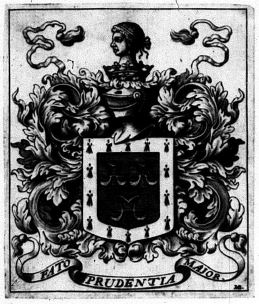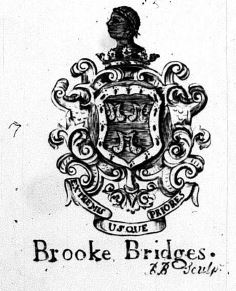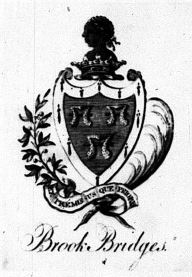Brook Bridges 1733-1791
Brook BRIDGES, 3rd bart 1733-1791
Biographical Note
The name Brook Bridges is shared by multiple generations of the same family, and this entry is largely replicated for each of them, as it is difficult to link surviving armorial bookplates to any specific individual.
Brook Bridges (1679-1728), son of Brook Bridges who was Auditor of the Imprest at the Treasury (d.1717), entered the Middle Temple in 1713; he appears to have followed his father's career. He inherited the estate of Goodnestone Park, Kent in 1717 and was made a baronet the following year; he was elected a fellow of the Royal Society in 1726.
The baronetcy passed down successive generations of the family, all christened Brook through to the 5th baronet (1801-75), who became Baron FitzWalter in 1868. The 2nd baronet, Brook Bridges (1709-1733), died the same year his son was born. This Brook (described in the present entry) became the 3rd baronet, was educated at Eton College and Trinity College, Cambridge, and by travelling in Europe. He was MP for Kent 1763-74, and undertook various building and landscaping works at Goodnestone.
Books
A series of 18th-century armorial bookplates, some anonymous, was made for members of this family. Franks 3704 and 3705 (anonymous) could be associated with the 1st baronet, or his father; 3689 ("Brooke Bridges") seems likely to have been used by the 1st baronet, before 1718, or possibly by his son. 3688, a late 18th century plate, might have been used by the 3rd baronet, or (perhaps more likely, as there is no title) by his son the 4th bart (1767-1829), before 1791? There was, presumably, a family library at Goodnestone which was augmented down the generations.
Sources
- Bridges baronets, Wikipedia.
- Sir Brooke Bridges, The Royal Society.
- History of Parliament.
- History of Goodnestone.
- Gambier Howe, E. R. J. Franks bequest: catalogue of British and American book plates bequeathed to the ... British Museum. London, 1903.
- ‘’Will of Sir Brook Bridges of Goodnestone , Kent’’, The National Archives PROB 11/1208/282.


